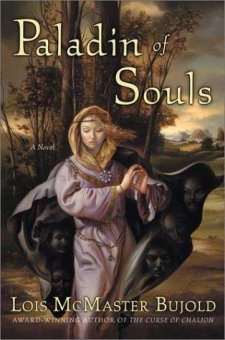What’s fantasy about?
One of my answers is that it’s about approaching the numinous. What I mean by that, simply, is that fantasy is about magic. Fantasy may be Tolkien’s “history, true or feigned,” and indeed it’s the feigned history of a place that never was, but what makes it more than that, what actually makes it fantastical, is the fact that it contains magic. (This defines the Vlad books as SF and leaves Ellen Kushner’s Swordspoint, C.J. Cherryh’s The Paladin, and, arguably, my own Tooth and Claw as platypodes but never mind that for the time being.) However, much fantasy as we have it includes magic without being about magic, and it’s even rarer for anything to go beyond magic to approach the numinous or the way the underlying universe works magically.
It’s something I think fantasy ought to do, so I’m always looking out for it. I saw it in Susannah Clarke’s brilliant Jonathan Strange and Mr Norrell, and in Pamela Dean‘s work, for instance, but a lot of fantasy (as I was saying) doesn’t seem interested in reimagining the world and just wants to tell the same sort of story.
Lois McMaster Bujold is a science fiction writer, so perhaps it’s not surprising that when she came to write fantasy she thought about this sort of thing. She thought about the economics of wormhole systems in the Miles books, and she thought about how technology changes over time, so it’s only reasonable when she turned to fantasy that she should have thought about how magic is woven through the world in a really deep way. In the Chalion books, and especially in Paladin of Souls we have it all woven seamlessly together, the gods, the magic, the history, curses, demons, life and death, all in the story of a retired mad queen who goes on a pilgrimage.
There are some writers who are loved and honoured and yet critically not taken seriously, and Bujold for some unimaginable reason seems to be one of them. This drives me nuts. People talk as if she wins Hugos because her fans are mindless legions who vote for anything she puts out, which is demonstrably untrue—none of her weaker books have won awards. Bujold is in fact a writer of subtle brilliance, and she ought to be appreciated more and taken seriously.
Paladin of Souls is about Ista, a woman in her forties who has failed at everything she has done. She has failed as a woman, as a queen, as a saint and as a mother. She has spent more than half her life mad. She is wracked with guilt. She has never been independent. Yet for saying she’s the opposite of every standard fantasy protagonist, she’s surprisingly appealing as a point of view character.
She sets out on pilgrimage, to shrines of the Five Gods. The Daughter, Mother, Son and Father have each their proper season, and the Bastard darts about keeping chaos in control. It’s the Bastard who has claimed Ista, she discovers as the story progresses. The characters are well done, as always with Bujold, the story is moving and exciting, the world, a version of Reconquest Spain, is interesting and well observed, but it’s the relation between the human world and the numinous one that makes this a really outstanding novel.
There are characters who have demons stuck inside them, and other characters who are manipulating demons. There’s someone who’s dead, but his ghost is still animating his body, so he hasn’t actually noticed yet. There are gods who can’t do anything in the world except through human agency, however desperately they may want to. There are things, specific and worrying things, that can happen to people after death. And there’s Ista, with her saddle sores cursing the gods and muddling along through all of it.
One of the differences between the real Middle Ages and the fantasy version of it we so often see is the way the divine lurked behind every tree and theological questions loomed large in people’s minds. Bujold manages a world with very different theological underpinnings but with this same sense of the nearness and significance of them.
Paladin of Souls won the Hugo, the Nebula and the Locus Award and it jolly well deserved them.










